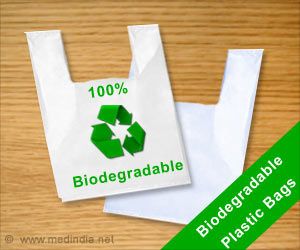Biodegradable polymer can now be made using the bacterial enzyme as per a study at the American Chemical Society (ACS) Central Science.
One of the most abundant biopolymers on earth is polysaccharides (strings of sugars) that could eventually replace some plastics with their versatile and environmental-friendly properties.
‘Scientists have identified a previously unknown bacterial enzyme that can make a new biodegradable molecule (polysaccharide), which could be useful for drug delivery, tissue engineering, and other biomedical applications.
’
The new polysaccharide is found to be similar to the biopolymer chitin. The study team used genomic data and activity-based screening, to identify a glycoside phosphorylase enzyme from bacteria called Acholeplasma laidlawii (common contaminant of laboratory cell cultures).
The team further expressed and purified the new enzyme, which they named acholetin. The new enzyme has wide-ranging potential as a new type of biocompatible, biodegradable material.
Source: Medindia



